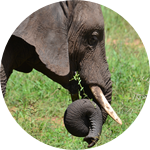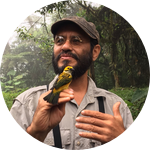About This Project
Roads generate negative effects on wildlife, including noise pollution that masks bird vocal communication. However, most studies on this theme have been conducted away from the tropics.
We use playback experiments in Costa Rica to test if noise also affects bird communication in the tropics. If this were the case as previously shown, we hypothesize that birds would modify their song structure in the context of noise playbacks to maximize signal emission.
Ask the Scientists
Join The DiscussionWhat is the context of this research?
Road expansions may be contributing to species decline at the global level. In Costa Rica, a total of 532 km of roads were found within a range of two or less kilometers of 70 protected areas. Because traffic noise can mask and degrade acoustic signals, birds need to adjust to the incoming noise at the expenses of fitness costs. This may explain a decrease in bird abundance and species richness in some studies.
To assess negative effects of roads on birds, we are developing an experimental protocol to evaluate communication responses by birds in different noise contexts.
What is the significance of this project?
Since most studies that investigate the interactions between road noise and bird communication have been conducted in temperate zones, the importance of finding support for the noise interference hypotheses in tropical environment is key. With this research, we will contribute to fill the gaps on how noise affects bird communication in the tropics and promote informed management decisions to mitigate negative effects.
What are the goals of the project?
We hypothesize that birds exposed to road noise modify their singing behavior to maximize signal transmission. To test this, we are developing a playback experiment protocol. The playback experiment protocol will provoke bird acoustic responses in different contexts of road noise. We will measure the time response to conspecific playback signals and the acoustic structure of the songs by the responders when exposed to road noise.
Our goal is to test whether birds modify their behavior when exposed to road noise and to determine the potential effects of those changes.
Budget
We use automatic autonomous sound recorders to obtain acoustic samples of the experimental contexts. We need to purchase two SM4 Song Meters to update our old recording equipment that have now limited capacity and power. The cost of one SM4 is $849, and we need good quality straps to attach them on trees. In addition, we need one dt-8851 sound level meter with a cost of $200. This sound level meters allows us a broad range of sound levels and good quality measurements of the environmental sound during our experiments.
Endorsed by
 Project Timeline
Project Timeline
The campaign timeline is from April 22 to May 10. We will train students on bioacoustic techniques in April. From April 22 to April 16 we will test our hypothesis and evaluate our experimental protocol. Form April 17 to May 15, we will analyze data to produce reports, posters and presentations to be shared. We will present the results in an academic symposium which would be recorded to be shared.
Apr 22, 2019
Training of 9 students on data collection, experimental design and bioacoustic techniques.
Apr 22, 2019
Collection of baseline ecological data on bird bioacoustic in proximity to a landscape subject to urban sprawl.
Apr 22, 2019
Project Launched
May 03, 2019
Academic symposium on bird population dynamics, bioacoustic and environmental sounds.
May 04, 2019
Poster contribution by students
Meet the Team
Edgardo Arévalo
I hold a PhD on behavioral ecology and have worked for the School for Field studies for 13 years. My research interests include tropical ecology and conservation biology.
I have conducted research on road ecology in Costa Rica since 2008, including road kill and noise pollution.
Project Backers
- 42Backers
- 100%Funded
- $2,011Total Donations
- $47.88Average Donation

